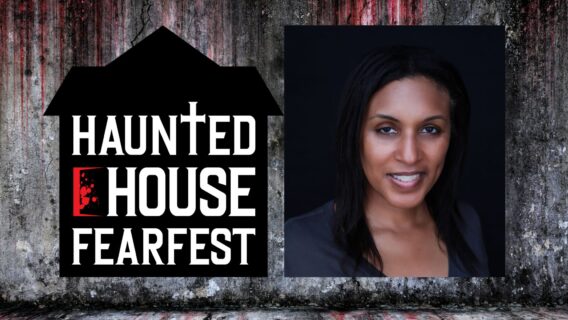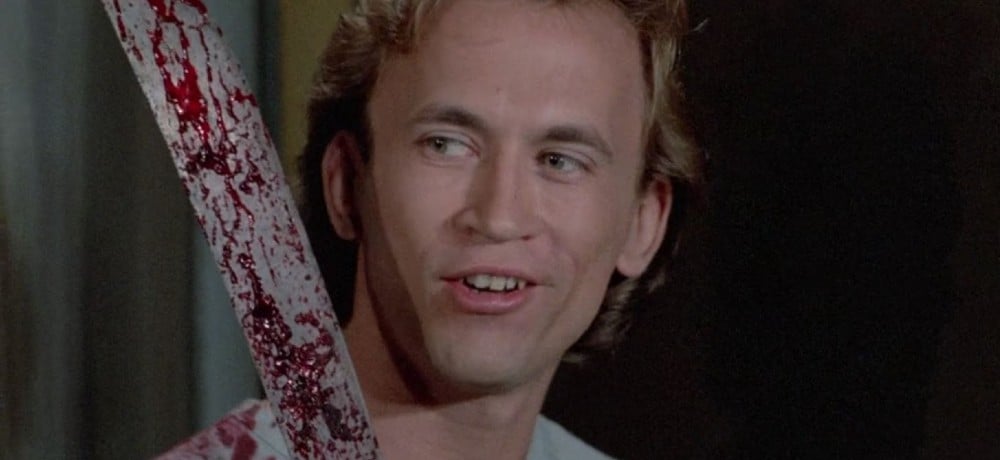How Renee Huff Leads the Haunted House FearFest Film Festival


This weekend, horror fans in New York have one more reason to scream: The Haunted House FearFest Film Festival, presented by HauntTV. Now in its fifth year, the festival is set to terrify and thrill its audience at Midtown Manhattan’s Midnight Theatre October 6-7. Originally established in Europe in 2017, the festival is making its stateside debut under its new owner and executive director Renee Huff.
Huff is a lifelong devotee of the genre. A natural leader, she spent her early professional years marketing horror and paranormal romance books for Simon & Schuster and then later founded her own media company, Looks Creepy Cool Studios. We caught up with her this week to chat about the Haunted House FearFest Film Festival, horror video games, and the first film that shaped the course of her life and career.
Dread Central: What’s your horror fan origin story?
Renee Huff: I’ve been a fan of horror films ever since I was a little girl. I watched horror movies and I read books from Christopher Pike and R.L. Stine. I’ll never forget my first horror movie. I was downstairs reading one of my R.L. Stine books and my dad called me upstairs to the living room. He was like, “Renee, Renee, there are people eating each other! You have to watch this movie!” So I rushed up the stairs and we watched The People Under the Stairs, directed by Wes Craven. I’ve seen that movie so many times. It’s the movie that got me hooked on horror. I’ve been a fan of the genre ever since. When I’m having a bad day, I watch a horror movie and it keeps me calm.
DC: Is there a particular kind of horror film that you gravitate towards? Do you have a favorite subgenre?
RH: It ranges! I did gravitate towards the The Hills Have Eyes franchise. [As for] my favorite [subgenre], I do love the paranormal. I watch Poltergeist every time it comes on. And then that leads into The Descent. I love that—the monsters in the cave. The paranormal. I don’t know what it is. It’s the unknown. That’s what it is! [laughs]
DC: What led you to own and direct the Haunted House FearFest Film Festival?
RH: I worked in entertainment. I worked at Simon & Schuster for a couple of years and I marketed horror books and paranormal romance books. I met Stephen King; I marketed one of his books, which was super exciting! I was so nervous. [laughs] And then after that, I worked at HBO [marketing] shows like Game of Thrones and True Blood and I did advanced screenings for The Hunger Games [and films like that] at MGM and Viacom. Then I went to PEOPLE to promote celebrity interviews on their streaming channel.
Horror has always been in the back of my head, and so fast-forward to last year, I connected with the founder of the film festival, which had been around in Europe for about four years. He wanted to step down and he was looking to sell it. I bought it and I rebranded it to make it my own and that’s what led me to the festival this year. It’s its first year in the U.S., so I’m super excited.
DC: So you learned about it through LinkedIn and just decided to buy it?
RH: Yeah, I just decided! I was like, “I’ll buy it.” [laughs] And I rebranded it. One of my friends who I used to work with at HBO created the logo. I’m grateful for my friends in the entertainment industry.
DC: What was it like rebranding the festival and adapting it for an American audience?
RH: It was easy because I dreamt about showcasing horror films and video games to a wider audience for a long time. So I was always planning even before I bought the festival and when I did, all my plans came into place. I believe I was put on this Earth to entertain people with horror and I enjoy every second of it. You know, I just want everyone to have a good time. If you can walk away with nightmares, or you can’t sleep without the lights on, or you’re just second-guessing something after going to the film festival, then it was all worth it. That’s what I want people to experience.
DC: What’s your approach to directing the Haunted House FearFest Film Festival and handling the publicity side of things?
RH: My approach is a blend of artistic curation, logistical excellence, community engagement, and a commitment to diversity and innovation. The heart of my film festival is its film and video game selection. Because I am the new owner, I wanted to rebrand the festival to highlight more women and diverse artists. So I assembled a diverse and knowledgeable judging panel that represents a wide range of genre interests, styles, and perspectives. It’s crucial to ensure that the festival is inclusive and represents a wide range of voices and backgrounds from various countries. I am proud to show films from different parts of the world ranging from Ecuador, Canada, the United Kingdom, Germany, France, Australia, and the United States.
To make the festival successful, I had my team focus on general awareness in the major press outlets and horror sites. Additionally, I leveraged social media, traditional marketing, and press relationships to promote the festival and attract a diverse audience.
I’m passionate about horror cinema and horror video games. The goal is to create an unforgettable experience for filmmakers, game developers, and audiences while promoting the art of horror. I am fortunate to have a network of talented individuals in the entertainment industry who contributed their expertise in filmmaking, graphic design, contract negotiations, and publicity to support the festival. Drawing from my background in entertainment marketing and distribution, I assumed a leadership role with confidence. Additionally, our dedicated volunteers bring invaluable knowledge and enthusiasm to the festival.
DC: Have you been to a lot of horror film festivals before?
RH: Before COVID, I used to go to the New York City Horror Film Festival. I went to the Tribeca Film Festival and I used to go to Toronto every year and see their horror film lineup. I used to travel to Sundance and see some of their horror films as well. So you know, I have been to a couple of film festivals, but the ones that I’ve been to [didn’t] highlight a lot of women who are filmmakers or a lot of diverse horror filmmakers, which is what I want to do differently.
And video games! I have never seen video games [in horror film festivals]. So that is something [else] I wanted to bring to the table. It’s exciting to have video games in the mix!
DC: I read that you’re the only woman of color to own a horror film festival.
RH: In New York, that I know of. I don’t know about other states, but as far as I know, I’m the only one.
I feel empowered. Who better to lead the charge given my background in entertainment and distribution? I’m not just starting from nothing. I have real experience working within the entertainment business and working with studios. So I feel empowered! Just going full steam ahead, like, “I am woman, hear me roar!” [laughs]
DC: Over your entire horror-consuming life, what evolutions or transformations have you witnessed, either on the screen or behind the camera, when it comes to Black and female representation in horror?
RH: I feel like from the early days when I was in high school watching Friday the 13th and Nightmare on Elm Street, horror films have a lot more women starring as not just survivors but leaders. It’s not just the dumb girl having sex and then she gets killed. I think with female horror filmmakers, and also actors in general, it’s like their roles are shifting, particularly on the director’s side. I feel like it doesn’t get a lot of highlights. I’m a Black woman who owns a horror film festival and being in this position [allows me to] shed light and find people who are filmmakers that have a great story to tell and want to showcase it to an audience. For these film festivals, I [also] really want to branch out and work with more organizations and outlets to have more Black horror filmmakers in my festival.
DC: What’s next for you after this weekend?
I’m building my brand. The film festival is under the umbrella of Looks Creepy Cool Studios, which I own. And so I have the film festival and a podcast, and I’m distributing films. That’s my current venture. I just want to go full steam ahead, after the film festival even more so. And I really want to discover more talent. I just love talking to filmmakers and game developers.
DC: Do you have any words of wisdom or advice for people who are either at the start of their horror careers or trying to break into the space?
RH: Do what you’re passionate about. There’s always a way—it doesn’t have to be a straight path. [When I worked for] HBO, I networked with indie filmmakers on the side. I didn’t sleep for a lot of my years and did side projects. When I told people I bought a horror film festival, they were like, “Oh, I didn’t think you could do that.” There’s always a different way to get your foot through the door. That’s what I want to tell people.
Categorized: Interviews





